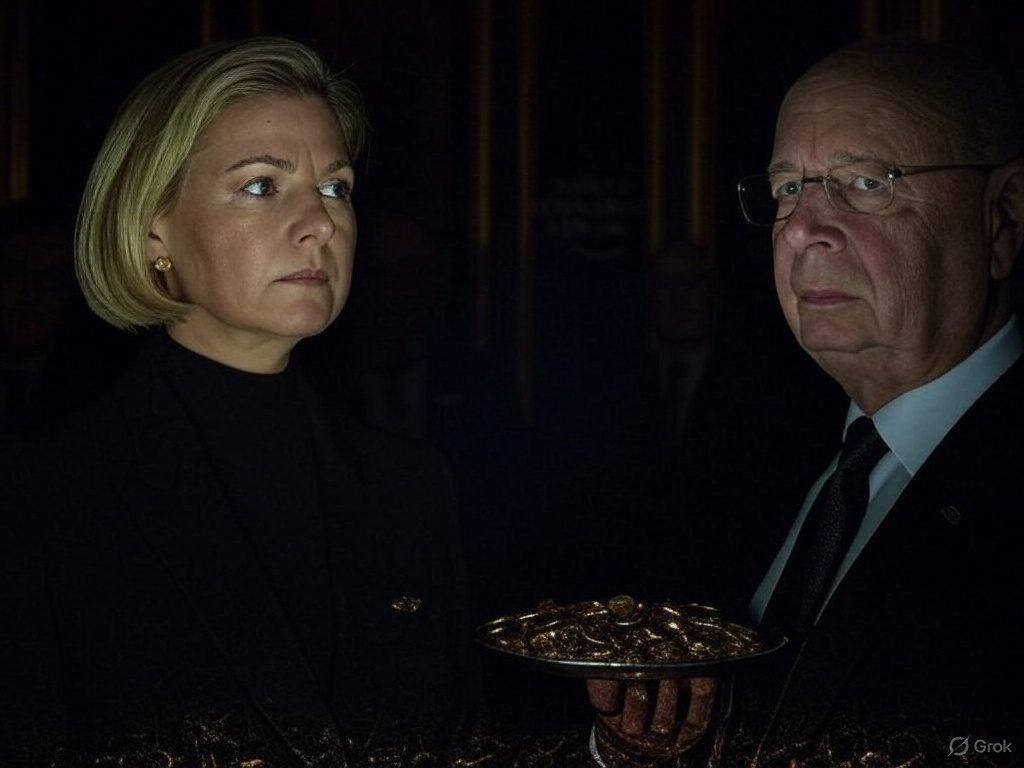The World Economic Forum (WEF), once heralded as the pinnacle of global economic thought leadership, now teeters on the brink of disgrace, its founder Klaus Schwab ensnared in a sordid scandal that lays bare the rot at the heart of this self-proclaimed arbiter of world affairs. On April 22, 2025, the WEF announced an independent investigation into allegations of financial and ethical misconduct against Schwab and his wife, Hilde, following a blistering whistleblower letter from current and former staff.
The accusations are as brazen as they are unsurprising. Schwab, the architect of the Davos elite’s annual pilgrimage, is accused of siphoning WEF funds for personal gain and allowing Hilde to treat the organization’s resources as her personal travel agency. This is not a mere misstep; it is a grotesque betrayal of the public’s trust by a man who has long cloaked his ambition in the guise of global betterment.
For over five decades, Schwab has positioned himself as the oracle of globalism, preaching “stakeholder capitalism” while presiding over an organization that reeks of exclusivity and privilege. The whistleblower letter, detailed in a Wall Street Journal report, paints a picture of a leader who blurred the lines between personal indulgence and institutional duty, allegedly funneling WEF resources to fuel his and his wife’s lavish lifestyle.
Hilde Schwab’s purported use of Forum funds for personal travel is not just a footnote; it’s a glaring symbol of the entitlement that has defined the WEF’s inner circle. The board’s unanimous decision to probe these claims, announced just a day after Schwab’s abrupt resignation as chairman on April 21, 2025, speaks volumes. This was no voluntary exit. It was a forced reckoning, a desperate attempt by the WEF to salvage its crumbling legitimacy.

The allegations extend beyond financial malfeasance, exposing a toxic culture festering under Schwab’s reign. Reports of harassment and discrimination within the WEF, coupled with Schwab’s alleged misuse of power, shatter the organization’s carefully curated image as a beacon of progress. The whistleblowers’ courage in calling out their former overlord contrasts sharply with Schwab’s cowardly response: a petulant denial and threats of defamation lawsuits.
His claim that the accusations are “baseless” rings hollow when the WEF’s own board, not exactly a bastion of radicalism, felt compelled to launch a formal investigation. This is not the behavior of an innocent man but the flailing of a cornered autocrat, desperate to protect his legacy from the truth.
Schwab’s defenders might argue that the WEF’s contributions to global dialogue justify overlooking his personal failings, but this is a dangerous delusion. The WEF has long been a playground for the ultra-wealthy, a place where billionaires and politicians congratulate themselves on “solving” global problems while the rest of the world bears the consequences of their policies. Schwab’s alleged misconduct is not an anomaly. It is more likely the inevitable outcome of an organization built on hubris and unaccountability.
The Davos crowd’s obsession with grandiose initiatives like the “Great Reset” has always masked a more prosaic reality. A clique of elites enriching themselves under the pretense of philanthropy. Schwab’s fall is a stark reminder that the WEF’s moral posturing has always been a facade, concealing the self-interest that drives its every move.
The public’s reaction, shows the depth of distrust Schwab and the WEF have earned. Users have jumped on the scandal, with posts framing Schwab’s investigation as the unmasking of a globalist puppet master. While some of these claims veer into excess and outlandish claims, the core sentiment is undeniable. People are fed up with unelected executives dictating the world’s future while flouting the principles they claim to uphold.
The WEF’s investigation may be a step toward accountability, but it is far too little, far too late. Schwab’s legacy is now irrevocably tainted, his resignation a tacit admission of guilt in the court of public opinion. The real question is whether the WEF can survive the stench of his scandals or if it will collapse under the weight of its own hypocrisy.
This moment demands more than a perfunctory probe; it calls for a wholesale dismantling of the WEF’s elitist machinery. Schwab’s alleged crimes are not just personal failings. They are symptomatic of an organization that has lost its moral compass, if it ever had one. The world deserves better than a cabal of self-appointed saviors who treat public resources as their personal piggy bank.
Klaus Schwab’s empire of influence is crumbling, and the reckoning could be devastating. The WEF may try to distance itself from its founder, but the stains of his tenure are indelible. This is a testament to the dangers of unchecked power masquerading as progress.
Author Profile

- Lucy Walker covers finance, health and beauty since 2014. She has been writing for various online publications.
Latest entries
- April 25, 2025Global EconomicsWhistleblowers Unmask Schwab’s Toxic WEF Secrets
- April 9, 2025Global EconomicsTariff Tensions Drive Market Volatility
- March 18, 2025Global EconomicsRed in Name Only: Labour’s War on the UK Working Class
- March 7, 2025SatoshiCraig Wright Banned from UK Courts with Civil Restraint Order




